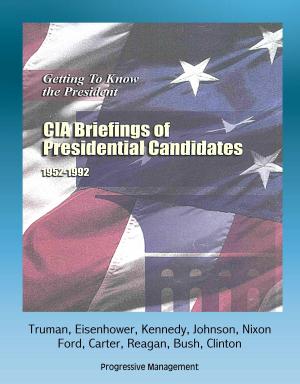FBI Report: Uniform Crime Reporting Handbook - Classifying and Scoring, Offenses, Jurisdiction
Nonfiction, Social & Cultural Studies, Political Science, Politics, Law Enforcement| Author: | Progressive Management | ISBN: | 9781301432165 |
| Publisher: | Progressive Management | Publication: | April 28, 2013 |
| Imprint: | Smashwords Edition | Language: | English |
| Author: | Progressive Management |
| ISBN: | 9781301432165 |
| Publisher: | Progressive Management |
| Publication: | April 28, 2013 |
| Imprint: | Smashwords Edition |
| Language: | English |
The Uniform Crime Reporting (UCR) Program has expanded in scope, importance, and size since its inception over seven decades ago. The Program began with law enforcement agencies in 400 cities from 43 states submitting crime data in January 1930 and now encompasses approximately 17,000 law enforcement agencies nationwide that voluntarily contribute their crime statistics. Without the support of these city, county, state, tribal, and federal agencies, the Program could not fulfill its mission to generate a reliable set of crime statistics for use in law enforcement administration, operation, and management. To ensure the best reporting possible, the UCR staff developed, and has further revised, this handbook to assist participating agencies in understanding and completing monthly and annual reporting forms. It is of the utmost importance that administrators, as well as those persons bearing responsibility for preparing the reports, have a thorough understanding of information contained in this handbook. The completeness and accuracy of each agency's crime reporting is crucial to a wide variety of data users so that they can understand crime, formulate policies, make strategic and operational decisions, and conduct criminological research and analysis.
Uniform crime reporting is a collective effort on the part of city, county, state, tribal, and federal law enforcement agencies to present a nationwide view of crime. Agencies throughout the country participating in the Uniform Crime Reporting (UCR) Program provide summarized reports on eight Part I offenses known to law enforcement and reports on persons arrested. They also provide information about law enforcement officers killed and assaulted and on hate crime. For the most part, agencies submit crime reports monthly to a centralized crime records facility within their state. The state UCR Program then forwards the data, using uniform offense definitions, to the FBI's national UCR Program. Agencies in states that do not have a state Program submit their statistics directly to the national Program. The FBI provides report forms, tally sheets, tally books, and self-addressed envelopes to these direct contributors (local agencies that do not have the benefit of a state Program). The FBI compiles, publishes, and distributes the data to participating agencies, state UCR Programs, and others interested in the Nation's crime data.
Contents include: Historical Background * The National Incident-Based Reporting System * Advisory Groups * Quality Assurance Review * State UCR Programs * Non-Program States * Law Enforcement Data Requirements
The Uniform Crime Reporting (UCR) Program has expanded in scope, importance, and size since its inception over seven decades ago. The Program began with law enforcement agencies in 400 cities from 43 states submitting crime data in January 1930 and now encompasses approximately 17,000 law enforcement agencies nationwide that voluntarily contribute their crime statistics. Without the support of these city, county, state, tribal, and federal agencies, the Program could not fulfill its mission to generate a reliable set of crime statistics for use in law enforcement administration, operation, and management. To ensure the best reporting possible, the UCR staff developed, and has further revised, this handbook to assist participating agencies in understanding and completing monthly and annual reporting forms. It is of the utmost importance that administrators, as well as those persons bearing responsibility for preparing the reports, have a thorough understanding of information contained in this handbook. The completeness and accuracy of each agency's crime reporting is crucial to a wide variety of data users so that they can understand crime, formulate policies, make strategic and operational decisions, and conduct criminological research and analysis.
Uniform crime reporting is a collective effort on the part of city, county, state, tribal, and federal law enforcement agencies to present a nationwide view of crime. Agencies throughout the country participating in the Uniform Crime Reporting (UCR) Program provide summarized reports on eight Part I offenses known to law enforcement and reports on persons arrested. They also provide information about law enforcement officers killed and assaulted and on hate crime. For the most part, agencies submit crime reports monthly to a centralized crime records facility within their state. The state UCR Program then forwards the data, using uniform offense definitions, to the FBI's national UCR Program. Agencies in states that do not have a state Program submit their statistics directly to the national Program. The FBI provides report forms, tally sheets, tally books, and self-addressed envelopes to these direct contributors (local agencies that do not have the benefit of a state Program). The FBI compiles, publishes, and distributes the data to participating agencies, state UCR Programs, and others interested in the Nation's crime data.
Contents include: Historical Background * The National Incident-Based Reporting System * Advisory Groups * Quality Assurance Review * State UCR Programs * Non-Program States * Law Enforcement Data Requirements















